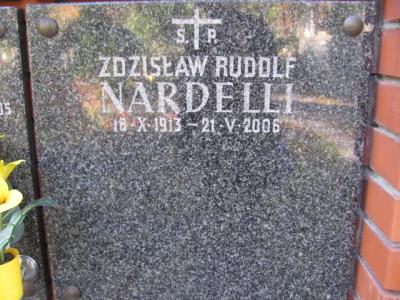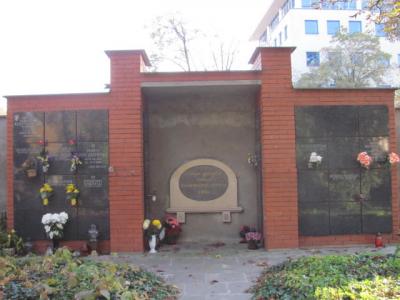Zdzisław Nardelli
Mediathek Sorted

Nardelli was culturally and artistically active in all the prisoner-of-war camps, where he wrote texts and poems, organised evening events, ran a theatre and prepared theatre performances. In Görlitz he made the acquaintance of the outstanding composer Olivier Messiaen who was a prisoner in Stalag VIII A. Messiaen took him under his charge. Nardelli organised “Polish Evenings” in which he recited his poetry to the sound of music composed by Messiaen whilst he was a prisoner. Thus Nardelli smoothed the way for the historic premiere of “Quartet for the End of Time” in Stalag VIII A. Today it is acknowledged as one of the most famous works in French chamber music and played in concert houses all over the world. Nardelli was held prisoner by the Nazis in Bonn, Monschau, Brauweiler and Cologne, where he was charged by the Gestapo of being involved in communist activities. He was finally found guilty and sent to the concentration camp in Buchenwald (detainee number 81824). Here he made contact with a communist underground cell. He succeeded in fleeing the camp shortly before its liberation by the American army in the first days of April 1945. From May onwards he began work in the Polish Centre in Erfurt as the head of the arts office. A short time afterwards he decided to return to Poland.
Nardelli was given the task of organising the programme of the Polish Radio broadcasting station in Kraków. Here he helped set up the Symphony Orchestra of the Republic of Poland under the direction of Jerzy Gert and worked hard to ensure that the trumpet signal “Hejnał” was broadcast every day at noon from the tower of the Church of St Mary in Kraków. Since then this has been a fixed part of the tradition of the radio programme. In 1949 he was moved to Szczecin and Koszalin, where he completely overhauled and restructured the radio stations there. After the death of his wife, with whom he had one son, Piotr, he began a relationship with a wonderful woman with the extraordinary name of Teodozja. In 1956 he started work as the chief director of Polish Radio in Warsaw, responsible for all radio broadcasts (with the exception of literature). Between 1969 and 1988 he was a theatre director at Polish Radio, where he encouraged a broad circle of befriended writers and authors to work with him. One in particular K. I. Gałczyński, even composed a cantata for Nardelli – Kantata na otwarcie Rozgłośni Radia w Szczecinie – on the occasion of the opening of the broadcasting station in Szczecin (it has now fallen into oblivion). He worked with great passion and energy and often took unconventional paths. Nardelli was to become one of the most outstanding radio play directors. An elite of actors worked under him: these included Ludwik Solski, Irena Eichlerówna, Czesław Wołłejko, Edward Dziewoński, Andrzej Łapicki, Stanisława Perzanowska, Tadeusz Fijewski, Danuta Szaflarska, Zbigniew Zapasiewicz and Gustaw Holoubek. All in all he created ca. 1.500 radio plays including the much-loved Polish “classics” Dziady [Forefathers' Eve] by Adam Mickiewicz, Wesele [The Wedding] and Warszawianka [The Woman of Warsaw] by Stanisław Wyśpiański, and also works by younger authors like Helmut Kajzer from Cieszyn. In doing so he used new technical solutions, for example by linking stereophonics with quadraphonics and exploiting the recording capabilities of the Polish Radio experimental studio, headed by Józef Patkowski. Nardelli ended his career in radio with a production of Rzeźnia [The Slaughterhouse] by Stanisław Mrożek. Polish Radio is still broadcasting all these radio plays today. In addition Nardelli was invited by foreign radio stations to direct radio plays by Polish authors. These included Sender Freies Berlin (Panie – The Ladies – by I. Iredyński), Centro di Produzione di Milano (La Fuga by H. Bardijewski), RAI in Rome (Non omnis moriar by J. Przybora), SBB Baden-Baden (Herr Lonek ist gekommen by M. Tonecki, featuring the popular actor Rolf Henniger), whereupon the press reaction was as follows: “A well-known Polish citizen is once more staying within the walls of our town…”, not forgetting the broadcasting stations in Bratislava (Czapa – by J. Krasiński) and Oslo. He was a member of the jury for the international radio competition “Prix Italia” in Turin. Furthermore he represented Polish Radio abroad, amongst others in Vienna and at the Congress of Radio Creators in Frankfurt am Main, during which he clashed with representatives of the young German school who attacked traditional radio play forms.
Nardelli received a huge number of prizes and awards for his radio work in Poland and abroad (including the Golden Microphone 1971). His most famous initiative as a director was the radio serial Matysiakowie [The Matysiak Family], which was broadcast between 1956 and 1978. He was awarded the Order of Polonia Restituta. Nardelli wrote four autobiographical tales: Pasztet z ojczyzny [A Pie from my Homeland] – an epic about September 1939; Otchłań ptaków [The Birds’ Hell] – a description of Hell in Nazi prison camps (including a mention of a meeting with Messiaen in the Görlitz camp); Płaskorzeźby dyletanta [The Bas-relief of a Dilettante] – a report on his passion at work as an organiser, also as a later radio adaptation recorded in Kraków in 1945. The fourth book with the title Sprzedawca śniegu [The Snow Salesman] has never been published.
Nardelli took part in cultural life in Warsaw until his death. He spent his summers writing in Orzechowo on the Narew. It was here that he experienced the tragic death of his nephew, the talented Polish actor, Andrzej Nardelli, in 1972. Nardelli died on 21. May 2006 and was laid to rest in the Evangelical-Augsburg Cemetery in Warsaw.
Polish soldiers were mobilised on 31. August, just one day before the invasion of the German forces in September 1939. After Nardelli bade farewell to his mother in Cieszyn he joined the fighting as a reserve cadet, pyrotechnician and commander of the Independent Fortification Artillery with the 3. Podhale Defence Regiment, belonging to the 21. Mountain Infantry Division stationed in the barracks at Bielsko. A few years previously in 1934/35, he had completed his training as a reserve cadet in Vłodymyr Vołyński. In a fragment from his story Pasztet z ojczyzny [A Pie from my Homeland] Nardelli accurately described the aimlessness and the tragic fate of the soldiers. The tale also gives a vivid outline of society in Cieszyn shortly before the outbreak of war and during its bloody course: part of this is written in Cieszyn Silesian dialect.
„… Oh divine Alighieri, in what circle of wandering hell have our senses landed, sated with the odour of burning bodies, the roasting of human fat, the sickening smell of persons and animals who have been massacred and ripped to pieces, the stink of swollen bellies.. In the first circle. For hasn’t it just begun?
The fire from destroyed vehicles has just been quenched, swarms of flies are buzzing around ominously. The one-sided murder of people was terrifying. Where were the scouts? Did this twisted bicycle stuck in a blood-soaked tree belong to one of them? Did the military cap hanging on the bushes belong to a torn off head? “Where are you, boys?” he wanted to cry. Semi-educated peasant slaves have fallen upon us, have-nots laden with complexes, insignificant sluggards, suckers and despicable creatures whose only identity consists of a swastika and a megalomaniac joy in bestiality – and all this as a result of an absurd substantive: Übermensch. An obsessive idiot has paralysed millions of people with washed out historical phrases. Who fell for them? Crooked intellectuals. People deprived of any imagination. Average unexceptional people and degenerate types who were bequeathed a divine power in exchange for blind obedience …”
After the battle of Tomaszów Lubelski had been lost, Nardelli was captured in Bortniki near Żydaczów in the county of Lemberg on 18. September 1939 in the eastern area now known as West Ukraine. He made an unsuccessful attempt to escape with a cadet named Z. Nycz near Szepietówka in Podolia. Following an exchange of prisoners between the Nazi and the Soviet forces he was put on a transport to the west. On the 22. September he made another attempt to escape from a railway wagon near Görlitz, but this too was unsuccessful. He finally arrived with his comrades at the transit camp at Konin Żagański in the 8. Wehrmacht District of Lower Silesia. Following his registration in Stalag VIII C in Sagan, where he was to stay for some time, he was given the detainee number 4985. Here he spend his first winter in the war and slowly adapted to conditions in a prisoner-of-war camp. He began to work in the areas of education and art, and encouraged his comrades to do likewise. One result was a satirical nativity play presented there to mark the New Year in 1940 and entitled Uwaga! Sagan wrze! [Beware! Things are simmering in Sagan!]. The complete extant nativity play is one of the most valuable documentary relics left by Polish prisoners in the camps. The frequently biting couplets were written by Nardelli along with the painter, Tadeusz Łakomski, who was known for his loquacity and refreshing humour. Łakomski also worked on the set and the puppets with the painter, Jan Świderski. On the 20. May 1940 Nardelli and other Polish POWs were transferred to Stalag VIII A in Görlitz. One month before the capitulation of France the Germans began to set up special camps to accommodate the forthcoming wave of POWs from the west.
In June 1940 Stalag VIII A in Görlitz was completed by the first Polish prisoners to be captured on the battlefields: these included Czesław Mętrak from Warsaw. Just like the Polish POWs in Sagan, they were taken to a transit camp – in Görlitz – where they survived the winter 1939/40 in tents. The Poles greeted the first transports of French POWs as if they were hosts, with friendship and great interest because they were keen to learn the latest news from the West of what was happening in the world outside. They made every effort to reassure the new arrivals who had lived through the trauma of defeat and imprisonment. The Polish prisoners had already managed to get their own “Polish library” (“Polish” because until then only Poles were interned in the camp, although most of the stocks were in German) and set up a Roman Catholic chapel. On top of this they were constantly applying to set up a community room, a request that was continually rejected by the Germans on the grounds that Poland no longer existed as a state and for that reason Polish prisoners had no rights whatsoever.
Because he was a writer, Zdzisław Nardelli was given responsibility for looking after the camp library. As a prisoner he had shown great strength of character, spoke fluent German and could deal with the Germans on an everyday level in a relatively relaxed manner. In mid July 1940 the composer Olivier Messiaen arrived in the camp on one of the many transport trains carrying French prisoners-of-war. He was soon to become one of the most famous composers of the 20th century. His imprisonment was to become a symbol of European culture: his Quartet for the End of Time the work he composed and performed in the camp aroused immense interest. Two other great musicians, both of them members of Paris orchestras, also arrived in the camp with Messiaen. The cellist Etienne Pasquier, was appointed to a labour group working in the quarry at Strzegom. Another, a priest by the name of Jean Brossard (detainee number 908), was on the same transport as Messiaen. He was to become the chaplain to the French POWs and was also given heavy labour duties in a more distant area away from the camp.
Here Messiaen’s friends requested the Poles to ensure that their talented comrades would be spared a similar fate. Nardelli decided to appoint Messiaen as his library assistant and succeeded in getting the consent of the camp commandant. The French composer was thus saved from backbreaking forced labour and could find refuge and peace in the Polish library, where he was free to think, meditate and work on new compositions. His arrangements were specially written for the musicians imprisoned in the Stalag, i.e. for violin, clarinet, cello and grand piano (here replaced by the camp piano). The Germans left Messiaen in peace: but it took some time before they truly realised the format and status of the personality interned in the Görlitz camp. The upshot was that Messiaen began to receive discrete help from the Germans, in particular from an NCO by the name of Karl-Albert Brüll, who was probably acting on his own initiative. Brüll was a lawyer by profession. He came from a respected notary’s family in Görlitz and was employed as an interpreter in the camp. He supplied Messiaen with manuscript paper, pencils and erasers, not forgetting food.
Nardelli’s next initiative was to organise a “Polish Evening” in mid December 1940, and to give it more status he invited Messiaen and the French musicians to attend. Along with Czesław Mętrak and Bohdan Samulski, Nardelli recited 13 poems he had written in the camp. Messiaen also agreed to play five works he had composed there. At the time nobody knew that these were parts of a work that was to later conquer the world: the Quartet for the End of Time. Bohdan Samulski produced a few dozen hand-written programmes, signed by the Polish promoters and the French musicians. Everything was marked by the camp censor with the seal “checked”. This precious document that bears witness to the premiere of fragments from the unfinished and unnamed Quartet written by Messiaen in the camp on the initiative of Polish POWs remained exclusively in Polish hands: with Zdzisław Nardelli and Czesław Mętrak in Warsaw, and Antoni Śliwiński in Kraków.
„This evening was one of the most interesting events that has ever taken place in the camp. Lieutenant Bull [Carl-Albrecht Brüll] stated that the concert was stirring and unique, the music by Olivier [Messiaen] difficult, gripping and utterly fitted to the poetry by the Polish poet, [Nardelli] – two similar contents expressed in different forms. Piskorz [Nardelli] recited slowly and with urgency. He treated the interpretation as simply as possible …
Kiedroń was fascinated by the music, grouped by the beauty of his new discoveries, the limitless possibilities of sounds. For the first time in his life he had come up against a form of music which he was unable to shake off and which went under his skin. He had never before imagined that music could cause wounds like broken glass. The listeners were caught in a balancing act of emotions and sent to the edge of an aesthetic climax. Messiaen dissolved traditional forms. They were too narrow for him. This was Kiedroń’s first encounter with such music. He didn’t know how he could find his way through it. He sensed its greatness and his shameful ignorance. He felt simply helpless in the face of it. The musical talents of the interpreters gave the glorious nature of the work an additional brilliance. In particular the incredible virtuosity shown by Akoka, who played the complicated score with the song of a canary and took the sound of the clarinet into a realm far removed from everyday reality. He was accompanied by Etienne Pasquier on cello, Le Boulaire on violin, and by the composer himself on piano: all of whom were masters on their own particular instruments.
Hence it was entirely unsurprising that the dying of the final chord was accompanied by great applause from the audience who surrounded the musicians and the astonished Messiaen. [Piskorz] thanked Bull for his friendly words, and in doing so he smiled sadly. Filled with bitterness he returned to his library behind the stacked up books. He was accompanied by Messiaen, who was all the more in need of a little peace and quiet …”
Another prisoner from the area of Nowogródek also remembers this “Polish Evening”: “[Besides concerts] several authors also declaimed poems; these included our comrade Zdzisław Nardelli (currently the head of the radio station in Kraków) who recited his own very beautiful poems. That said, it was very difficult to get hold of books, especially Polish books. By contrast the French had a whole lot of books and for this reason I often used their library.”
The organisation of the “Polish Evening” in the Görlitz Stalag was proof that it was possible to perform the works composed by Messiaen in the camp in a masterly manner. The German officers responsible for administrating the camp led by Colonel Alois Bielas exploited this fact and one month later they organised a pompous, official premiere of Messiaen’s composition. But this time only the French POWs were ordered to show up in the theatre barracks on Wednesday 15. January 1941. This was not the usual day for concerts and cultural events. At dusk the prisoners marched in columns back to the camp direct from their heavy labour. Around 400 French and a few Belgian prisoners managed to gather in the theatre barracks. By contrast the Poles were ignored. Indeed they were not even informed that the concert was to take place. This explains why neither Nardelli, the organiser of the Polish/French evening of poetry and music, nor the Polish detainees were present at the official premiere of the Quartet. Two weeks after the concert on 29 January 1941, all the Poles in the camp in Görlitz were transferred nearer to the centre of Germany.
The world premiere of the Quartet for the End of Time made a deep impression on its listeners despite their difficulty in perceiving such surprisingly new “classical” music. The critic of the French camp paper “Le Lumignon“ spoke straight away of the birth of a masterpiece created in prison, thereby creating the basis for the fame and honour which Messiaen’s work has enjoyed to the present day. For decades the composer maintained a public silence on his experiences in prison in Silesia. Towards the end of his life he admitted: “Despite the terrible circumstances we played my composition, but I do not know whether the audience understood it because it was not composed of music connoisseurs but of unhappy people. People like us. The audience were gripped because they were unhappy and we (the musicians) were equally unhappy, and the work had been composed by a fellow prisoner. For me it was certainly the finest concert in my life.”
All the Polish prisoners, including Nardelli, were taken from the Stalag in Görlitz before Messiaen and the cellist Pasquier were freed. The two French musicians were set free because they had been unarmed soldiers. An additional argument for this was also Messiaen’s initial service as a medical worker. They returned home on a transport on 16. February 1941. After his return, Messiaen struggled to establish his existence in France’s new, pro-fascist Vichy regime under Marshal Pétain. Due to a lucky chance and the support of the famous professor and organist M. Dupré he took over the post of a lecturer at the Paris Conservatory from a retiring member of staff. This was the beginning of Messiaen’s brilliant career as a lecturer and teacher of three generations of European and international composers. Above all this stability gave him the chance to further his own artistic creations and advance his career as an outstanding composer. Now he was to follow his own path in the 20th century. His major work is considered to be the opera Saint Francis of Assisi; this was also received enthusiastically by audiences in Katowice and Warsaw.
Nardelli’s imprisonment lasted considerably longer than the seven months endured by Messiaen. Indeed, it became ominously and increasingly dramatic until the end of the war. Along with his fellow Polish prisoners from Görlitz, on 3 February 1941 Nardelli arrived in the camp in Fullen (in Emsland on the borders of the Netherlands), that was a part of stalag VI B in Neu Versen. The POWs spent over two months here before they were moved to the camp in Hoffnungsthal. After the exhausting work in the Fullen peat bogs Nardelli perked up once more in the camp in Hoffnungsthal am Wahn (it was also a part of the complex containing Stalag VI B in Neu Versen). He was appointed to the post of theatre director by the Germans, gave lessons in the form of secret courses, participated in sabotage actions and operated with a conspiratorial cell of the Home Army. During this time he worked closely with Świętosław Krawczyński, who composed and arranged the music, as well as playing the piano for the shows in the camp. In this way the works of Nardelli and others were presented on stage. Krawczyński recalls this as follows: “[His art] was fairytale-like, full of humour, rhyming; hidden behind its grotesque symbolism was the conviction that a Polish POW could not be corrupted by a German.” There was also a world premiere production of the comedy Dom Otwarty [The Open House] and some revues by Michał Bałucki, which enjoyed great popularity amongst the audience because they reminded them of the small theatres and cabarets in pre-war Warsaw.
Unfortunately Nardelli decided not to conceal his left-wing views from his fellow prisoners in the camp, despite warnings from some of his comrades. There were many informers and hypocrites in the camps who, depressed by their circumstances and living conditions, tried to keep their heads above water at any price and even to improve their personal position. On 21 December 1943 Nardelli was arrested in the labour battalion number 281 in Hoffnungsthal, charged with communist activities and taken to the prison in Bonn. The ensigns Witold Karcz and Jan Sokal were also arrested with him. On Christmas Eve the Polish doctor and ensign Jan Merkel succeeded in supplying them with food, tobacco and medical articles. After Christmas, and a series of interrogations they were transported to a camp in Monschau, where Nardelli worked as a cook.
On 6. June 1944 some members of the Gestapo drove up in a Citroen, arrested Nardelli and Karcz and took them to another prison in Brauweiler. Jan Sokal remained in the camp because the Gestapo were no longer interested in him. Nardelli was taken before a war tribunal and condemned. He was thrown into prison in Monschau, where he remained until 14. September 1944, before being transferred to Cologne. Finally he was taken by the Gestapo to the concentration camp in Buchenwald, where he just managed to survive the last winter of the war. Nardelli succeeded in escaping from the camp in April 1945, shortly after its evacuation and subsequent liberation by American troops. After five years imprisonment under inhumane conditions he regained his freedom on German soil.
In May that year Nardelli arrived at the Polish Centre in Erfurt. This was the meeting place for Polish displaced persons, i.e. former internees in concentration camps, POWs and members of the Polish armed services. Nardelli took over the post of head of the “arts office” and organised a “theatre group”. That said it was not long before he decided to return to Poland as soon as possible. In mid-1945 he turned this decision into reality with two of his comrades, Tadeusz Findziński and Janusz Zarzycki. A warning by a guard on the border bridge aroused his anxiety, for he had called out:
“Where in the devil’s name are you returning to? Do you want to end up in Siberia? […] That was what a Polish soldier called out – wrote Nardelli – just as we were about to cross the border to kiss the soil of our fatherland…“
Although Nardelli described himself on his way to Poland as a “left-leaning poet” whose documents containing four years of writings in the camps had been confiscated by the Gestapo, and whose lust for life and belief in the importance of writing had been destroyed, he nevertheless admitted that after all his time in prisons and concentration camps, he had more confidence in his physical powers than in his intellectual capabilities. Nardelli moved through the ruins of Warsaw into his beloved and scarcely touched Kraków. “The burnt out poet travelled on the roof of a train, robbed of his work and seeing no sense in starting from scratch once again.” But the return to his home had a primordial meaning: Kraków, like himself had remained unscathed. Kraków, the city of his youth and his time as a student was the scene of Nardelli’s reincarnation. Here he was charged with setting up a broadcasting station for Polish Radio. This task unleashed hitherto hidden powers within him, rekindled his enthusiasm for life and gave him fresh motivation.
Nardelli’s many years of fruitful work for Polish Radio, his specialisation in directing radio plays, his productions of radio plays and performances by the Polish Radio Theatre Company became a Polish speciality almost certainly because of Nardelli’s efforts, made a major contribution to promoting his magnificent career. His hugely original creations earned him a huge number of national and international prizes. After he had finished working in radio, the next stage of his life resulted in valuable autobiographical precise observations and philosophical resections in the books he wrote. Today they offer a priceless aid in reconstructing the atmosphere of September 1939, the imprisonment in Görlitz and the events he experienced with Olivier Messiaen that were to go down in history. From the perspective of his creative work and his achievements we can now recognise his journey from the ancient aristocratic Nardelli family in Cieszyn to becoming one of the most outstanding representatives of Polish culture.
Alongside the remarks and memories of many of his prison contemporaries to be found in the visitor’s book for the “Sagan Nativity Play” with the title Uwaga! Sagan Wrze! [Beware! Things are simmering in Sagan!] There is also a contribution by Zdzisław Nardelli:
“The sun has its own particular form of humour – it throws shadows. Might our shadows perhaps be thrown further than us?
Sagan, 22. January 1940. Zdzisław Nardelli”
Jerzy Stankiewicz, April 2016
Bibliography:
Zdzisław Nardelli, Świt na nowo [Daybreak Anew]. Tomik poezji [volume of poetry], Warsaw 1938.
Zdzisław Nardelli, Kawiarnia plastyków [The Café of Painters], in: Cyganeria i polityka. Wspomnienia krakowskie 1919-1939 [Bohemia and politics. Memories from Kraków 1919-1939], Warsaw 1969.
Zdzisław Nardelli, Proza nasycona poezją [Prose saturated with poetry], introduction to: Jerzy Janicki, Kłaniaj się drzewom [I bow before the trees], Warsaw 1973.
Zdzisław Nardelli, Pasztet z ojczyzny [A Pie from the Homeland], Katowice 1985.
Zdzisław Nardelli, Płaskorzeźby dyletanta [The Bas-Relief of a Dilettante]. Warsaw 1988.
Zdzisław. Nardelli, Otchłań ptaków [The Birds’ Hell], Katowice 1989.
Anne Bongrain (ed.), Messiaen au Conservatoire, Paris 2008.
Myriam Chimènes (ed.), La Vie musicale sous Vichy, Brussels 2004.
Antoine Goléa, Rencontres avec Olivier Messiaen, Paris 1961.
Peter Hill, Nigel Simeone, Olivier Messiaen, Paris 2008.
Tadeusz Kaczyński, Messiaen, Kraków 1984.
Hannelore Lauerwald, In Fremdem Land, Görlitz 1997.
Hannelore Lauerwald, Primum vivere. Zuerst leben. Wie Gefangene das Stalag VIII A in Görlitz erlebten. Dokumentation auf Grundlage mündlicher and schriftlicher Quellen ehemaliger Kriegsgefangener aus Frankreich, Belgien and Italien, Bautzen 2009.
Anthony Pople, Quatuor pour la fin du Temps, Cambridge 1998.
Rebecca Rischin, Et Messiaen composa…, Paris 2006.
Almut Rössler, Beiträge zur geistigen Welt Olivier Messiaens, Duisburg 2008.
Claude Samuel, Permanences d’Olivier Messiaen, Arles 1999.
Thomas Daniel Schlee, Dietrich Kämper (oprac.), Olivier Messiaen. La Cité céleste – Das himmlische Jerusalem. Über Leben and Werk des französischen Komponisten, Cologne 1998.
Jerzy Stankiewicz, „Quatuor pour la fin du temps“ von Olivier Messiaen, w: Via Regia kontrovers — Dialog der Horizonte. Internationaler Workshop 2006 in der Europastadt Görlitz–Zgorzelec, hrsg. v. Peter Baumgardt, Gerhard Müller, Görlitz–Zgorzelec 2007.
Jerzy Stankiewicz, Ile wykonań „Kwartetu na koniec Czasu” Oliviera Messiaena odbyło się w Stalagu VIII A w Görlitz? Nowe fakty i hipotezy 70 lat później [How often was the “Quartet for the End of Time” by Olivier Messiaen played in Stalag VIII A in Görlitz? New facts and hypotheses 70 years after], „Res Facta Nova”, (Poznań), Nr. 12 (2011).
Jerzy Stankiewicz, Composé et créé dans un camp nazi. Le secret de la naissance du ”Quatuor pour la fin du Temps” d’Olivier Messiaen , „Schweizer Musikzeitung”, (Zürich), Nr. 5 (2012).
Jerzy Stankiewicz, Olivier Messiaen na Śląsku, „Śląsk” [Olivier Messiaen in Silesia], (Katowice), Nr. 4 (2015).
Małgorzata Woźna-Stankiewicz, Idee twórcze Oliviera Messiaena [The Artistic Ideas of Olivier Messiaen], „Muzyka”, (Warsaw), Nr. 4 (1978).
Małgorzata Woźna-Stankiewicz, Medytacje muzyczne Oliviera Messiaena [Musical Meditations by Olivier Messiaen]. „Chrześcijanin a współczesność” [Christ and the Present Day] (Breslau), Nr. 4 (1989).
Roman Zgłobicki, Życie kulturalne w obozie jeńców wojennych Stalagu VIII w Zgorzelcu [Cultural Live in the POW camp Stalag VIII in Görlitz]. „Rocznik Jeleniogórski” [Hirschberger Jahrbücher], vol. 18 (1980).
Roman Zgłobicki, Hitlerowski obóz jeńców wojennych w Zgorzelcu Stalag VIII A (Görlitz-Moys) i jego cmentarze [The National Socialist POW camp Stalag VIII A in Görlitz-Moys and its cemeteries], chapter in work: Ebd., Obozy i cmentarze wojenne w Zgorzelcu [War camps and cemeteries in Görlitz]. Zgorzelec 1995.






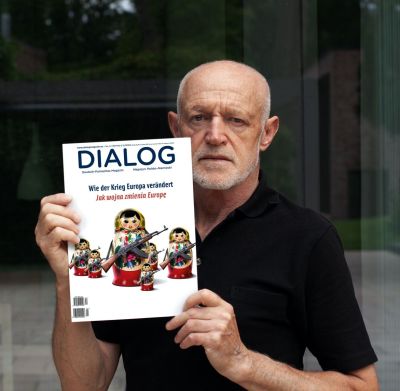






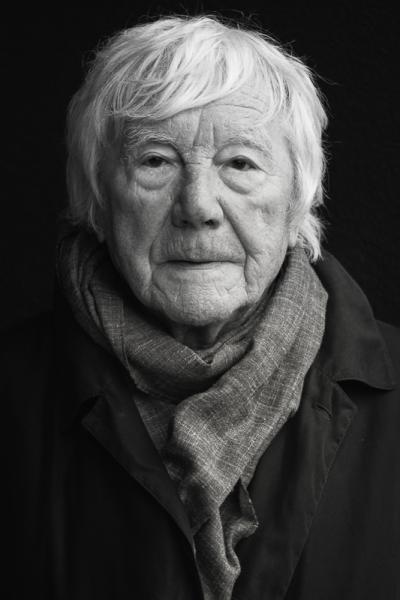

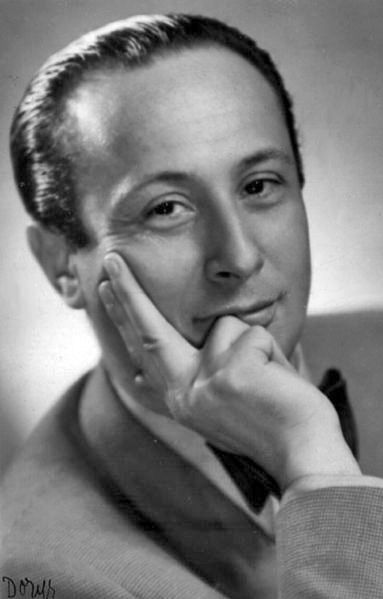

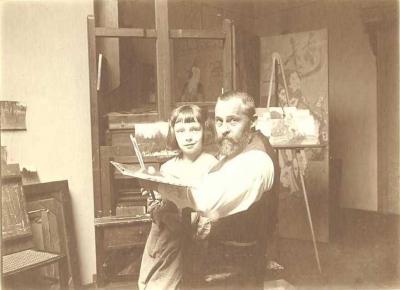
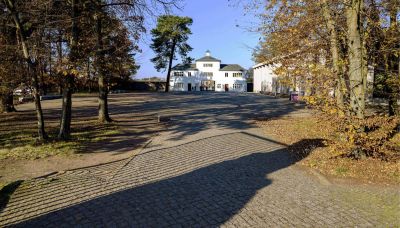

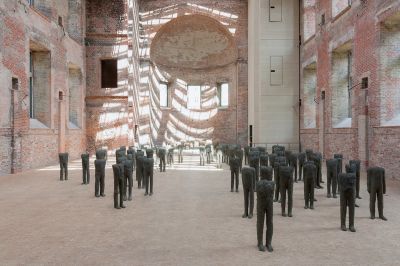


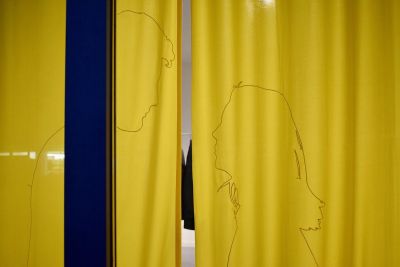
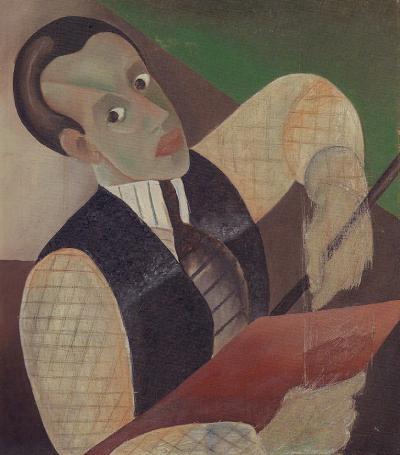

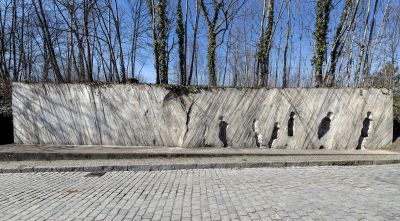
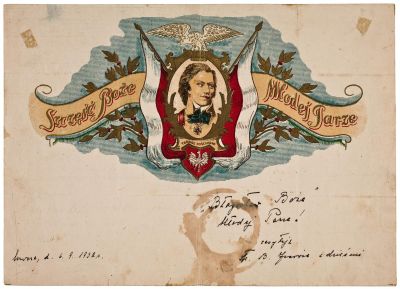









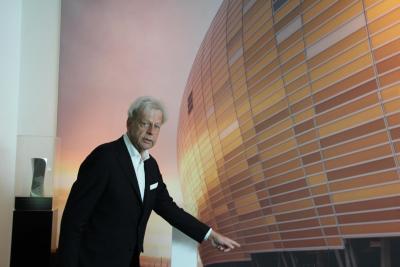



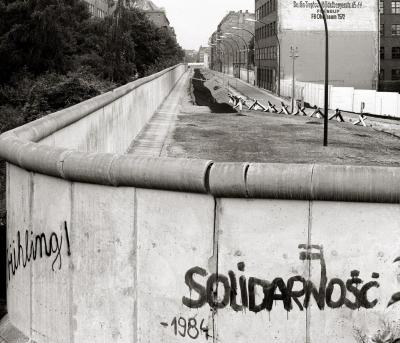
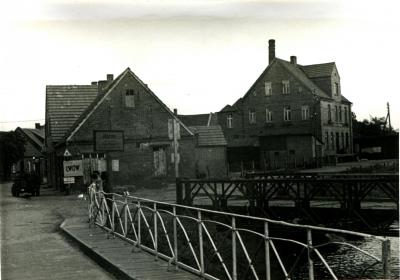






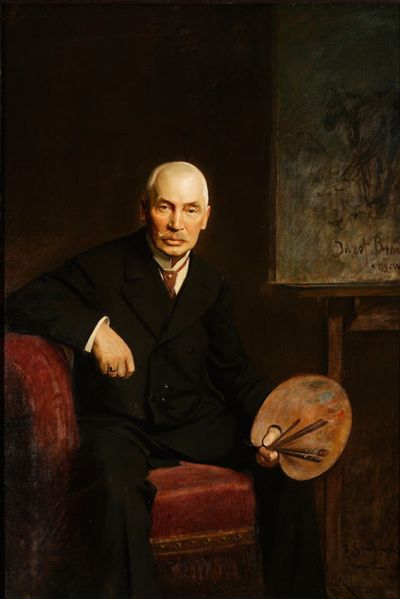









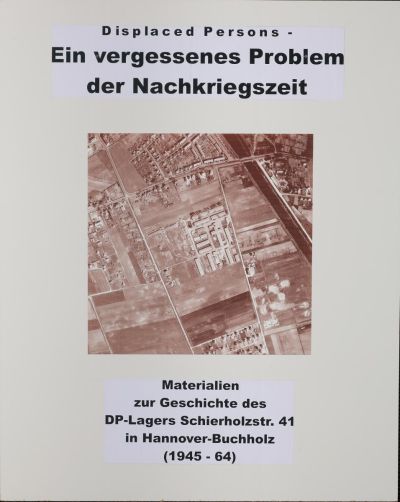





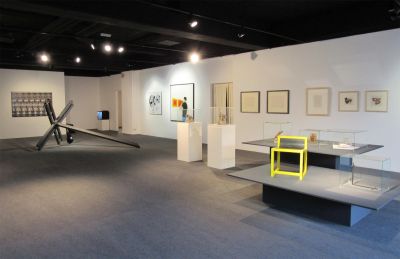



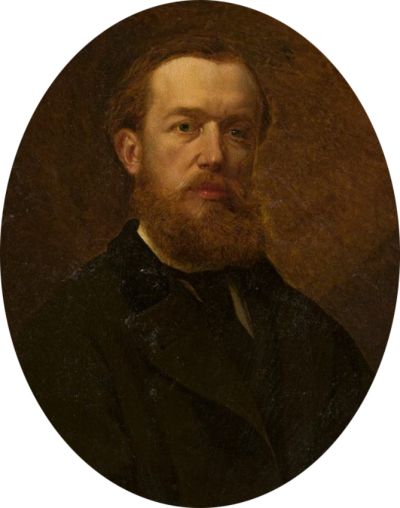





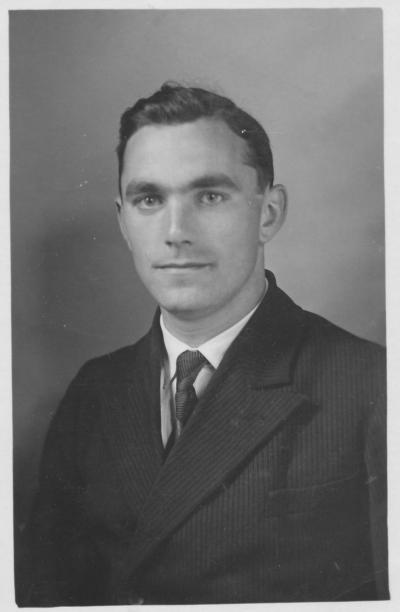




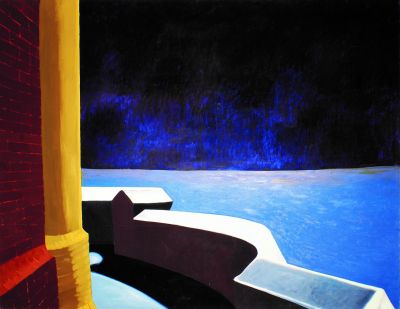

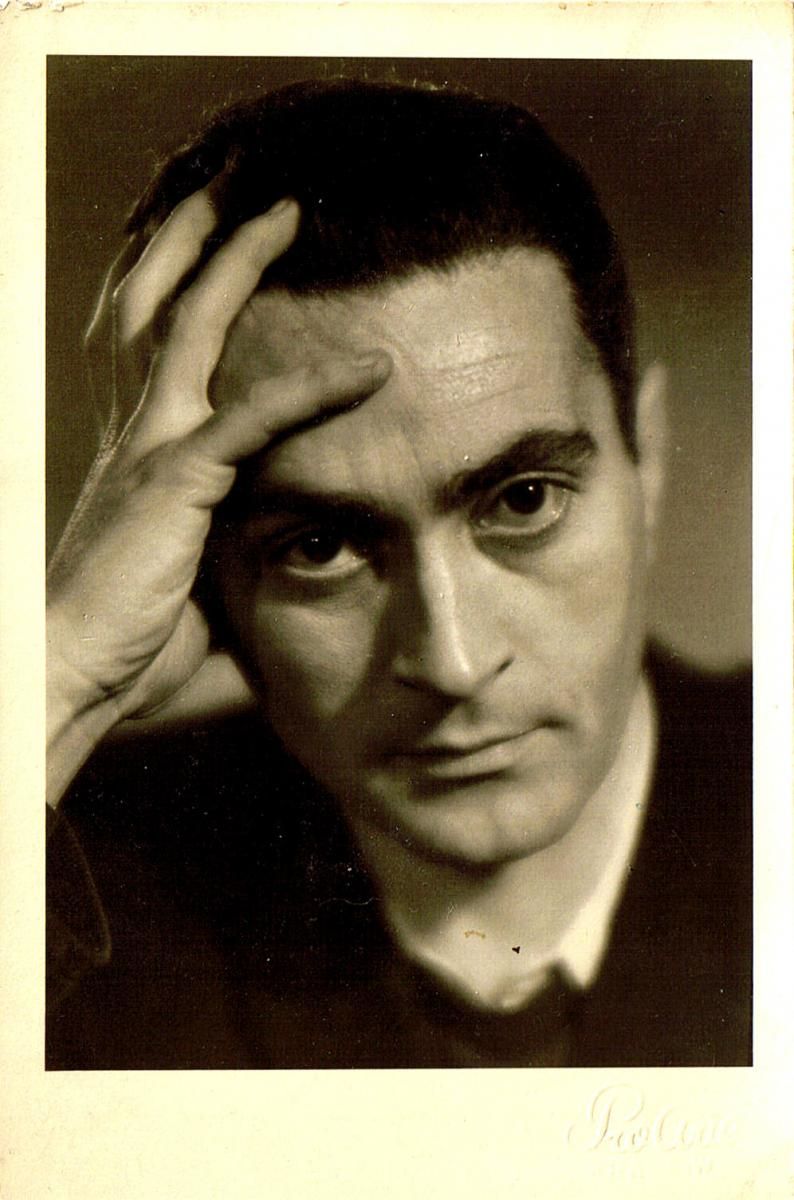
![His debut as poet, Warsaw 1938 His debut as poet, Warsaw 1938 - „Świt na nowo” [Daybreak Anew], tomik poezji [volume of poetry], editor, F. Hoesick. Warsaw 1938, and poem entitled “Wyjazd” [Departure].](/sites/default/files/styles/width_100_tiles/public/assets/images/1._nardelli_swit_okladka_0.jpg?itok=XtuveBzH)
![Stalag VIII C in Sagan Stalag VIII C in Sagan - A reprint from the file in the Muzeum Obozów Jenieckich [POW Camp Museum].](/sites/default/files/styles/width_100_tiles/public/assets/images/2._zagan_folder.jpg?itok=rMCH1RCU)
![„Szopka Sagańska” [Sagan Nativity Play] „Szopka Sagańska” [Sagan Nativity Play] - „Uwaga! Sagan wrze…” [Beware! Things are simmering in Sagan...] (Title page), A Nativity Play for the New Year, presented by Polish prisoners in Sagan (1939) and Görlitz (1940).](/sites/default/files/styles/width_100_tiles/public/assets/images/3._szopka_saganska.jpg?itok=3zhM3IZy)
![„Szopka Sagańska” „Szopka Sagańska” - “Oczko we mgle…” [A Tiny Eye in the Fog], page with the censor’s triangular seal and the word “checked”, in Stalag VIII C in Sagan.](/sites/default/files/styles/width_100_tiles/public/assets/images/4._szopka_saganska.jpg?itok=EzGpZ0FL)
![Zdzisław Nardelli, Caricature, 1939 Zdzisław Nardelli, Caricature, 1939 - A caricature of Zdzisław Nardellis in: “Szopka Sagańskiej” [Sagan Nativity Play], completed in Stalag VIII C in Sagan, winter 1939.](/sites/default/files/styles/width_100_tiles/public/assets/images/5._nardelli_karykatura.jpg?itok=koe6bqgv)
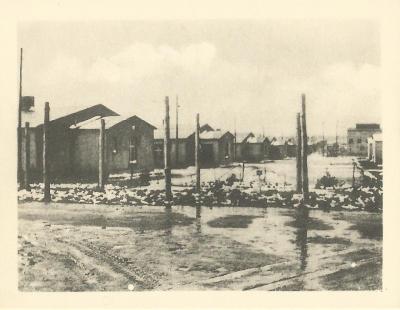
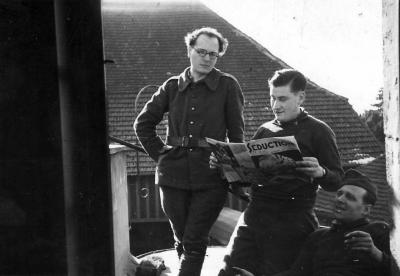
![“Wieczór polski” [Polish Evening] in Görlitz, mid-December 1940 “Wieczór polski” [Polish Evening] in Görlitz, mid-December 1940 - Cover of the programme of the Polish Evening, put together by Bohdan Samulski, Stalag VIII A in Görlitz, mid-December 1940.](/sites/default/files/styles/width_100_tiles/public/assets/images/8._wieczor_polski_1940_program_s._1-4_600dpj.jpg?itok=ZrxNTYFw)
![“Wieczór polski” [Polish Evening] in Görlitz, mid-December 1940 “Wieczór polski” [Polish Evening] in Görlitz, mid-December 1940 - Cover of the programme of the Polish Evening, put together by Bohdan Samulski, Stalag VIII A in Görlitz, with the seal of the camp censor, “checked”, mid-December 1940.](/sites/default/files/styles/width_100_tiles/public/assets/images/9._wieczor_polski_1940_program_s._2-3_600dpj.jpg?itok=gGw67Eiq)
![Ensign Czesław Mętrak, a portrait by Bohdan Samulski, December 1940 Ensign Czesław Mętrak, a portrait by Bohdan Samulski, December 1940 - Ensign Czesław Mętrak, co-promoter of “Wieczór polski” [Polish Evening]. After fleeing from prison he succeeded in returning to Poland and served as a second lieutenant “Duch” in the Home Army.](/sites/default/files/styles/width_100_tiles/public/assets/images/10.-cz.jpg?itok=sGDzxbSv)
![Ensign Bohdan Samulski, 1941 Ensign Bohdan Samulski, 1941 - Co-promoter of “Wieczór polski” [Polish Evening]. After fleeing from prison he became an officer in the 1. Tank Division of General Stanisław Maczek, and was awarded the order Virtuti Militari.](/sites/default/files/styles/width_100_tiles/public/assets/images/11._b._samulski_0.jpg?itok=9_FJWMBr)
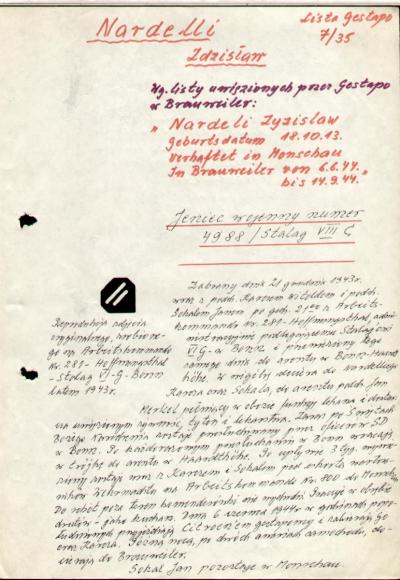
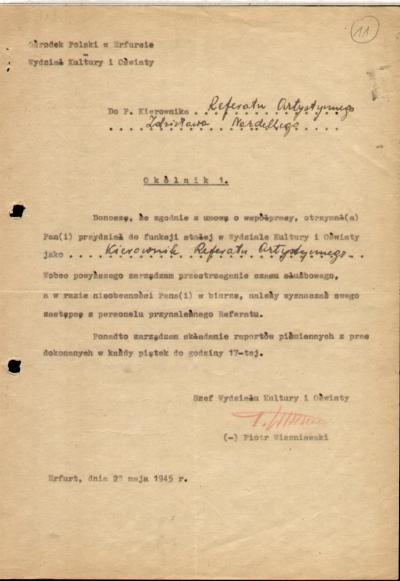
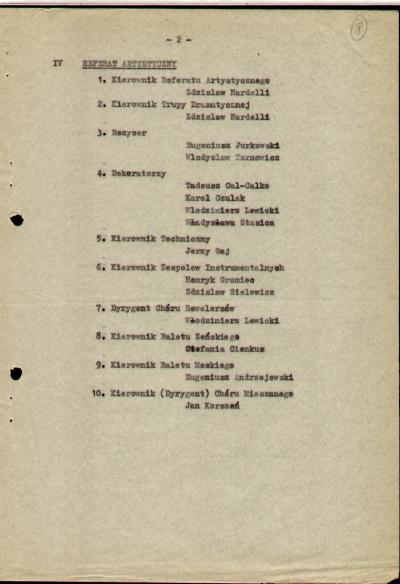
![The sole existing film roll The sole existing film roll - Zdzisław Nardelli in the film by Antoni Bohdziewicz “Za wami pójdą inni…” [Others will be following you], 1949.](/sites/default/files/styles/width_100_tiles/public/assets/images/15._z._nardelli_w_filmie.jpg?itok=HiQspfto)
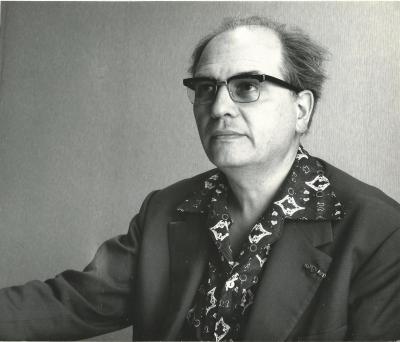
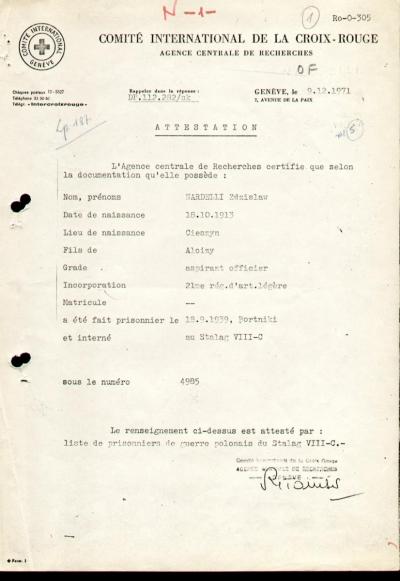
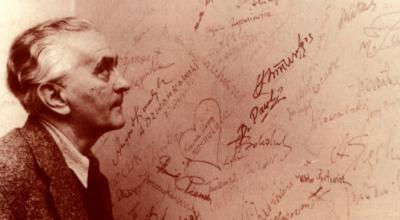
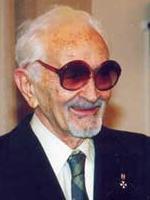
![Zdzisław Nardelli “Pasztet z ojczyzny” [A Pie from the Homeland] Zdzisław Nardelli “Pasztet z ojczyzny” [A Pie from the Homeland] - Zdzisław Nardelli “Pasztet z ojczyzny” [A Pie from the Homeland], Wyd. “Śląsk”, Katowice 1986, okładka.](/sites/default/files/styles/width_100_tiles/public/assets/images/20._nardelli_pasztet_okladka.jpg?itok=awWM9OsG)
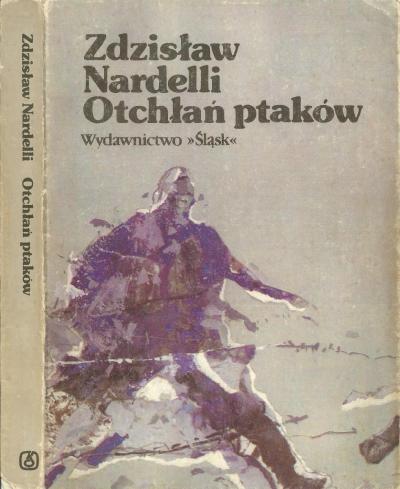
![Dedication written Zdzisław Nardelli Dedication written Zdzisław Nardelli - A dedication written by Zdzisław Nardelli for Jerzy Stankiewicz in a copy of “Otchłań ptaków” The Birds’ Hell], Warsaw, 27. March 2002.](/sites/default/files/styles/width_100_tiles/public/assets/images/22._nardelli_1989_dedykacja.jpg?itok=LszHQZ-E)
![“Płaskorzeźby dyletanta” [The Bas-Relief of a Dilettante] “Płaskorzeźby dyletanta” [The Bas-Relief of a Dilettante] - Zdzisław Nardelli “Płaskorzeźby dyletanta” [The Bas-Relief of a Dilettante], Wyd. Radia i Telewizji [Radio and TV publisher], Warsaw 1988, cover by Zdzisław Nardelli.](/sites/default/files/styles/width_100_tiles/public/assets/images/23._nardelli_plaskorzezby_okladka.jpg?itok=O3spRHrT)
